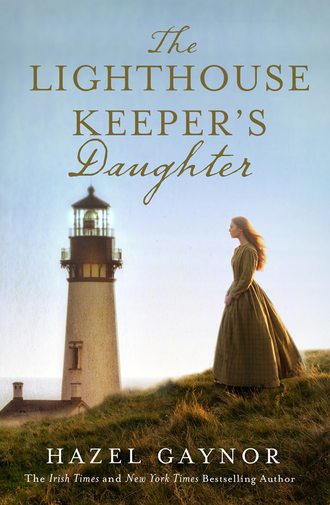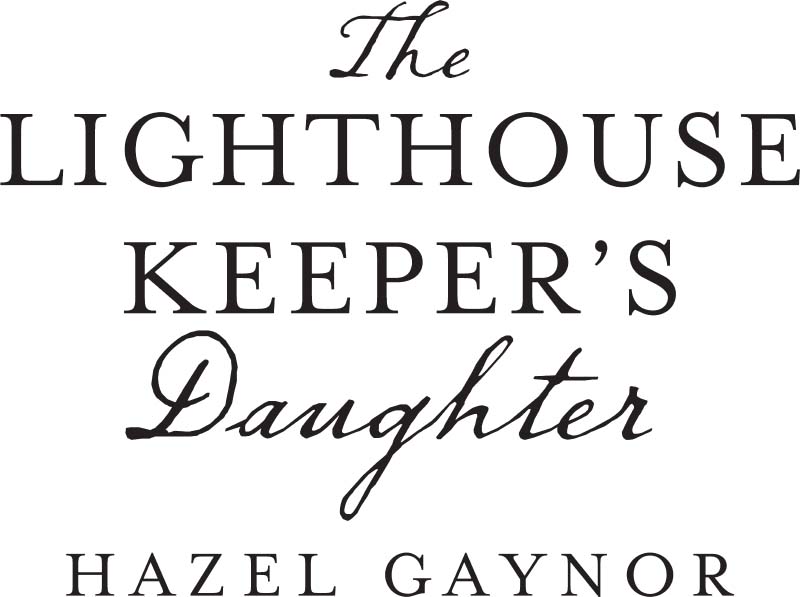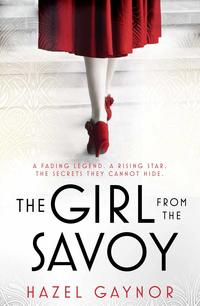
Полная версия
The Lighthouse Keeper’s Daughter



Copyright
Published by HarperCollinsPublishers Ltd
1 London Bridge Street
London SE1 9GF
www.harpercollins.co.uk
First published in Great Britain by © HarperCollinsPublishers 2018
Copyright © Hazel Gaynor 2018
Cover design: Claire Ward © HarperCollinsPublishers Ltd 2018
Cover photographs © Jill Battaglia / Trevillion Images
(Lighthouse/background), Lee Avison / Arcangel images (Woman on hill)
Hazel Gaynor asserts the moral right to be identified as the author of this work.
A catalogue copy of this book is available from the British Library.
This novel is entirely a work of fiction. The names, characters and incidents portrayed in it are the work of the author’s imagination. Any resemblance to actual persons, living or dead, events or localities is entirely coincidental.
All rights reserved under International and Pan-American Copyright Conventions. By payment of the required fees, you have been granted the non-exclusive, non-transferable right to access and read the text of this e-book on screen. No part of this text may be reproduced, transmitted, down-loaded, decompiled, reverse engineered, or stored in or introduced into any information storage and retrieval system, in any form or by any means, whether electronic or mechanical, now known or hereinafter invented, without the express written permission of HarperCollins.
Source ISBN: 9780008255213
Ebook Edition © September 2018 ISBN: 9780008255237
Version: 2018-08-07
Dedication
For courageous women everywhere. You know who you are.
Epigraph
I am not afraid of storms, for I am learning how to sail my ship.
—Louisa May Alcott

There are two ways of spreading light; to be the candle, or the mirror that reflects it.
—Edith Wharton
Contents
Cover
Title Page
Copyright
Dedication
Epigraph
Prologue: Matilda
Volume One
Chapter One: Sarah
Chapter Two: Grace
Chapter Three: Sarah
Chapter Four: Grace
Chapter Five: Sarah
Chapter Six: Grace
Chapter Seven: Sarah
Chapter Eight: Grace
Chapter Nine: Sarah
Chapter Ten: Grace
Chapter Eleven: Matilda
Chapter Twelve: Matilda
Chapter Thirteen: Harriet
Chapter Fourteen: Matilda
Chapter Fifteen: Grace
Chapter Sixteen: Grace
Chapter Seventeen: Grace
Volume Two
Chapter Eighteen: Matilda
Chapter Nineteen: Harriet
Chapter Twenty: Matilda
Chapter Twenty-One: Grace
Chapter Twenty-Two: Grace
Chapter Twenty-Three: Grace
Chapter Twenty-Four: Grace
Chapter Twenty-Five: Matilda
Chapter Twenty-Six: Matilda
Chapter Twenty-Seven: Harriet
Chapter Twenty-Eight: Matilda
Chapter Twenty-Nine: Grace
Chapter Thirty: Grace
Chapter Thirty-One: Grace
Chapter Thirty-Two: Grace
Chapter Thirty-Three: Grace
Chapter Thirty-Four: Matilda
Chapter Thirty-Five: Harriet
Chapter Thirty-Six: Matilda
Volume Three
Chapter Thirty-Seven: Grace
Chapter Thirty-Eight: Grace
Chapter Thirty-Nine: Matilda
Chapter Forty: Matilda
Chapter Forty-One: Grace
Chapter Forty-Two: George
Chapter Forty-Three: Grace
Chapter Forty-Four: Grace
Chapter Forty-Five: Matilda
Chapter Forty-Six: Matilda
Chapter Forty-Seven: Grace
Chapter Forty-Eight: Matilda
Chapter Forty-Nine: Harriet
Chapter Fifty: Grace
Chapter Fifty-One: Matilda
Chapter Fifty-Two: Harriet
Chapter Fifty-Three: Matilda
Chapter Fifty-Four: Grace
Chapter Fifty-Five: George
Chapter Fifty-Six: Matilda
Epilogue
Acknowledgments
Author’s Note
The Creation of a Heroine
Reading Group Questions
Keep Reading …
About the Author
Also by Hazel Gaynor
About the Publisher
PROLOGUE
MATILDA
Cobh, Ireland. May 1938

THEY CALL IT Heartbreak Pier, the place from where I will leave Ireland. It is a place that has seen too many goodbyes.
From the upper balcony of the ticket office I watch the third-class passengers below, sobbing as they cling to their loved ones, exchanging tokens of remembrance and promises to write. The outpouring of emotion is a sharp contrast to the silence as I stand between my mother and Mrs. O’Driscoll, my chaperone for the journey. I’ve done all my crying, all my pleading and protesting. All I feel now is a sullen resignation to whatever fate has in store for me on the other side of the Atlantic. I hardly care anymore.
Tired of waiting to board the tenders, I take my ticket from my purse and read the neatly typed details for the umpteenth time. Matilda Sarah Emmerson. Age 19. Cabin Class. Cobh to New York. T.S.S. California. Funny, how it says so much about me, and yet says nothing at all. I fidget with the paper ticket, tug at the buttons on my gloves, check my watch, spin the cameo locket at my neck.
“Do stop fiddling, Matilda,” Mother snips, her pinched lips a pale violet in the cool spring air. “You’re making me anxious.”
I spin the locket again. “And you’re making me go to America.” She glares at me, color rushing to her neck in a deep flush of anger, her jaw clenching and straining as she bites back a withering response. “I can fiddle as much as I like when I get there,” I add, pushing and provoking. “You won’t know what I’m doing. Or who with.”
“Whom with,” she corrects, turning her face away with an exaggerated sniff, swallowing her exasperation and fixing her gaze on the unfortunates below. The cloying scent of violet water seeps from the exposed paper-thin skin at her wrists. It gives me a headache.
My fingers return defiantly to the locket, a family heirloom that once belonged to my great-great-granny Sarah. As a child I’d spent many hours opening and closing the delicate filigree clasp, making up stories about the miniature people captured in the portraits inside: an alluring young woman standing beside a lighthouse, and a handsome young man, believed to be a Victorian artist, George Emmerson, a very distant relative. To a bored little girl left to play alone in the drafty rooms of our grand country home, these tiny people offered a tantalizing glimpse of a time when I imagined everyone had a happy ever after. With the more cynical gaze of adulthood, I now presume the locket people’s lives were as dull and restricted as mine. Or as dull and restricted as mine was until half a bottle of whiskey and a misjudged evening of reckless flirtation with a British soldier from the local garrison changed everything. If I’d intended to get my mother’s attention, I had certainly succeeded.
The doctor tells me I am four months gone. The remaining five, I am to spend with a reclusive relative, Harriet Flaherty, who keeps a lighthouse in Newport, Rhode Island. The perfect hiding place for a girl in my condition; a convenient solution to the problem of the local politician’s daughter who finds herself unmarried and pregnant.
At one o’clock precisely, the stewards direct us to board the tenders that will take us out to the California, moored on the other side of Spike Island to avoid the mud banks in Cork Harbor. As I step forward, Mother grasps my hand dramatically, pressing a lace handkerchief to her paper-dry cheeks.
“Write as soon as you arrive, darling. Promise you’ll write.” It is a carefully stage-managed display of emotion, performed for the benefit of those nearby who must remain convinced of the charade of my American holiday. “And do take care.”
I pull my hand away sharply and say goodbye, never having meant the words more. She has made her feelings perfectly clear. Whatever is waiting for me on the other side of the Atlantic, I will face it alone. I wrap my fingers around the locket and focus on the words engraved on the back: Even the brave were once afraid.
However well I might hide it, the truth is, I am terrified.
VOLUME ONE
founder: (verb)
to become submerged; to come to grief

I had little thought of anything but to exert myself to the utmost, my spirit was worked up by the sight of such a dreadful affair that I can imagine I still see the sea flying over the vessel.
—Grace Darling
CHAPTER ONE
SARAH
S.S. Forfarshire. 6th September, 1838

SARAH DAWSON DRAWS her children close into the folds of her skirt as the paddle steamer passes a distant lighthouse. Her thoughts linger in the dark gaps between flashes. James remarks on how pretty it is. Matilda wants to know how it works.
“I’m not sure, Matilda love,” Sarah offers, studying her daughter’s eager little face and wondering how she ever produced something so perfect. “Lots of candles and oil, I expect.” Sarah has never had to think about the mechanics of lighthouses. John was always the one to answer Matilda’s questions about such things. “And glass, I suppose. To reflect the light.”
Matilda isn’t satisfied with the answer, tugging impatiently at her mother’s skirt. “But how does it keep going around, Mummy? Does the keeper turn a handle? How do they get the oil all the way to the top? What if it goes out in the middle of the night?”
Suppressing a weary sigh, Sarah bobs down so that her face is level with her daughter’s. “How about we ask Uncle George when we get to Scotland. He’s sure to know all about lighthouses. You can ask him about Mr. Stephenson’s Rocket, too.”
Matilda’s face brightens at the prospect of talking about the famous steam locomotive.
“And the paintbrushes,” James adds, his reedy little voice filling Sarah’s heart with so much love she could burst. “You promised I could use Uncle George’s easel and brushes.”
Sarah wipes a fine mist of sea spray from James’s freckled cheeks, letting her hands settle there a moment to warm him. “That’s right, pet. There’ll be plenty of time for painting when we get to Scotland.”
She turns her gaze to the horizon, imagining the many miles and ports still ahead, willing the hours to pass quickly as they continue on their journey from Hull to Dundee. As a merchant seaman’s wife, Sarah has never trusted the sea, wary of its moody unpredictability even when John said it was where he felt most alive. The thought of him stirs a deep longing for the reassuring touch of his hand in hers. She pictures him standing at the back door, shrugging on his coat, ready for another trip. “Courage, Sarah,” he says as he bends to kiss her cheek. “I’ll be back at sunrise.” He never said which sunrise. She never asked.
As the lighthouse slips from view, a gust of wind snatches Matilda’s rag doll from her hand, sending it skittering across the deck and Sarah dashing after it over the rain-slicked boards. A month in Scotland, away from home, will be unsettling enough for the children. A month in Scotland without a favorite toy will be unbearable. The rag doll safely retrieved and returned to Matilda’s grateful arms, and all interrogations about lighthouses and painting temporarily stalled, Sarah guides the children back inside, heeding her mother’s concerns about the damp sea air getting into their lungs.
Below deck, Sarah sings nursery rhymes until the children nap, lulled by the drone of the engines and the motion of the ship and the exhausting excitement of a month in Bonny Scotland with their favorite uncle. She tries to relax, habitually spinning the cameo locket at her neck as her thoughts tiptoe hesitantly toward the locks of downy baby hair inside—one as pale as summer barley, the other as dark as coal dust. She thinks about the third lock of hair that should keep the others company; feels the nagging absence of the child she should also hold in her arms with James and Matilda. The image of the silent blue infant she’d delivered that summer consumes her so that sometimes she is sure she will drown in her despair.
Matilda stirs briefly. James, too. But sleep takes them quickly away again. Sarah is glad of their innocence, glad they cannot see the fog-like melancholy that has lingered over her since losing the baby and losing her husband only weeks later. The doctor tells her she suffers from a nervous disposition, but she is certain she suffers only from grief. Since potions and pills haven’t helped, a month in Scotland is her brother’s prescription, and something of a last resort.
As the children doze, Sarah takes a letter from her coat pocket, reading over George’s words, smiling as she pictures his chestnut curls, eyes as dark as ripe ale, a smile as broad as the Firth of Forth. Dear George. Even the prospect of seeing him is a tonic.
Dundee. July 1838
Dear Sarah,
A few lines to let you know how eager I am to see you, and dear little James and Matilda—although I expect they are not as little as I remember and will regret promising to carry them piggy back around the pleasure gardens! I know you are anxious about the journey and being away from home, but a Scottish holiday will do you all the world of good. I am sure of it. Try not to worry. Relax and enjoy a taste of life on the ocean waves (if your stomach will allow). I hear the Forfarshire is a fine vessel. I shall be keen to see her for myself when she docks.
No news, other than to tell you that I bumped into Henry Herbert and his sisters recently at Dunstanburgh. They are all well and asked after you and the children. Henry was as tedious as ever, poor fellow. Thankfully, I found diversion in a Miss Darling who was walking with them—the light keeper’s daughter from Longstone Island on the Farnes. As you can see in the margins, I have developed something of a fondness for drawing lighthouses. Anyway, I will tell you more when you arrive. I must rush to catch the post.
Wishing you a smooth sailing and not too much of the heave ho, me hearties!
Your devoted brother,
George
x
p.s. Eliza is looking forward to seeing you. She and her mother will visit while you are here. They are keen to discuss the wedding.
Sarah admires the miniature lighthouses George has drawn in the margins before she folds the letter back into neat quarters and returns it to her pocket. She hopes Eliza Cavendish doesn’t plan to spend the entire month with them. She isn’t fond of their eager little cousin, nor her overbearing mother, but has resigned herself to tolerating them now that the engagement is confirmed. Eliza will make a perfectly reasonable wife for George and yet Sarah cannot help feeling that he deserves so much more than reasonable. If only he would look up from his canvas once in a while, she is sure he would find his gaze settling on someone far more suitable. But George will be George and even with a month at her disposal, Sarah doubts it will be long enough to change his mind. Still, she can try.
Night falls beyond the porthole as the ship presses on toward Dundee. One more night’s sailing, Sarah tells herself, refusing to converse with the concerns swimming about in her mind. One more night, and they’ll be safely back on dry land. She holds the locket against her chest, reminding herself of the words John had engraved on the back. Even the brave were once afraid.
Courage, Sarah, she tells herself. Courage.
CHAPTER TWO
GRACE
Longstone Lighthouse. 6th September, 1838

DAWN BLOOMS OVER the Farne Islands with soft layers of rose-tinted clouds. From my narrow bedroom window I admire the spectacle, while not trusting it entirely. We islanders know, better than most, how quickly the weather can turn, and there is a particular shape to the clouds that I don’t especially care for.
After spending the small hours on watch, I’m glad to stretch my arms above my head, savoring the release of tension in my neck and shoulders before climbing the steps to the lantern room. Another night navigated without incident is always a cause for quiet gratitude and I say my usual prayer of thanks as I extinguish the Argand lamps, their job done until sunset. The routine is so familiar that I almost do it without thought: trim the wicks, polish the lenses of the parabolic reflectors to remove any soot, cover the lenses with linen cloths to protect them from the glare of the sun. Necessary routine tasks which I take pride in doing well, eager to prove myself as capable as my brothers and eager to please my father.
A sea shanty settles on my lips as I work, but despite my efforts to focus on my chores, my thoughts—as they have for the past week—stubbornly return to Mr. George Emmerson. Why I persist in thinking of him, I cannot understand. We’d only spoken briefly—twenty minutes at most—but something about the cadence of his Scots burr, the particular way he rolled his r’s, the way he tilted his head when surveying the landscape, and most especially his interest in Mary Anning’s fossils, has stuck to me like barnacles on a rock. “Tell me, Miss Darling, what do you make of Miss. Anning’s so-called sea drrragons?” My mimicry brings a playful smile to my lips as I cover the last of the reflectors, idle thoughts of handsome Scotsmen temporarily concealed with them.
The lamps tended to, I walk once around the lantern to catch the beauty of the sunrise from all angles. From the first time I’d climbed the spiraling lighthouse steps at the age of seven, it was here, at the very top of the tower, where I loved to be most of all, the clouds almost within touching distance, the strong eighty-foot tower below keeping us safe. The uninterrupted view of the Farne Islands and the Northumbrian coast hangs like a vast painting in a private gallery, displayed just for me, and despite the growl in my stomach I’m in no hurry to head downstairs for breakfast. I lift Father’s telescope from the shelf and follow a flock of sandwich terns passing to the south before lowering the lens to watch the gulls bobbing about on the sea, waiting for the herring fleet to return. The patterns of light on the surface of the water remind me of Mary Herbert’s silk dress shimmering as she danced a reel at last year’s harvest home ball.
Dear Mary. Despite our friendship, she and her sister, Ellen, have always thought me a curious creature, unable to understand how anyone could possibly prefer the wind-lashed isolation of an island lighthouse to the merry hubbub of a dance. “Will we see you at the ball this year, Grace? Henry is anxious to know.” Their dedication to the cause of finding me a suitable husband—preferably their brother—is nothing short of impressive, but the business of marriage doesn’t occupy my thoughts as it does other women of my age, who seem to think about little else. Even my sisters, who now live over on the Main, perpetually tease me about being married to the lighthouse. “You’ll never find a husband if you hide away in your tower, Grace. You can’t very well expect the tide to deliver one to you.” Time and again, I have patiently explained that even if I did marry I would merely be swapping the life of a dutiful daughter for that of a dutiful wife, and from what I’ve observed I’m not at all convinced the institution of marriage is worth the exchange. It is a point well-made, and one they find difficult to argue with.
As I make my way down to the service room which sits just below the lantern room, I pause at the sound of my father’s voice floating up the steps.
“You coming down, Gracie?” Mam has a fresh loaf. She insists it needs eating before the mice get to it.”
His Trinity House cap appears above the top step, followed by thick eyebrows, white as the lime-washed tower walls. I take his arm to help him up the last few steps.
“You’re supposed to be resting,” I scold.
His breathing is labored. His cheeks—already rusted from decades of wind and sun—scarlet with the effort of climbing the ninety-three steps from the ground floor. “I know, pet. But Mam mithers when I rest. Thought I’d be better off resting where she can’t see me.” He winks as he sinks gladly into his favorite chair, taking the telescope from me and lifting it to his eye. “Anything doing?”
“Mercifully quiet,” I remark, adding a few lines to the Keeper’s Log about the weather and the sea conditions before recording the tides. “A few paddle steamers and fishing vessels passed. The seals are back on Harker’s Rock.”
Father scans the horizon, looking for anything unusual among the waves, interpreting the particular shape of the swells, crests, and troughs. It bothers him that his eyesight isn’t what it used to be, glad to have me as a second pair of eyes. We make a good team; him the patient teacher, me the eager pupil.
“Seals on Harker’s Rock, eh. Local fishermen will tell you that’s a sign of a storm coming. Mam’s already fretting about your brother getting back.” He focuses the telescope on the clouds then, looking for any indication of approaching squalls or incoming fogs or anything to suggest an imminent change in the conditions. My father reads the clouds and the behavior of the seabirds as anyone else might read directions on a compass, understanding the information they offer about bad weather approaching, snow on the way, a north wind blowing. Partly by his instruction and partly by an inherent islander’s instinct nurtured over my twenty-two years, I have absorbed some of this knowledge, too. But even the most experienced mariner can occasionally be fooled.


